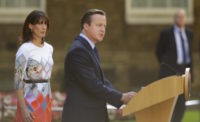Four leading U.K. contractors and design firms support Great Britain voting to stay in the European Union, with a national referendum now set for June 23.
The "in or out" vote follows a Feb. 19 agreement by government heads of the group's 27 other member states to modify Great Britain’s terms of membership.
CEOs of contractors Mace Group plc., Carillion plc. and of consultants Arup and W.S. Atkins plc. were among nearly 200 other top executives—many from the country's largest corporations—who signed a Feb. 23 open letter to a national newspaper.
“Britain is better off staying in a reformed European Union," said the letter, which added that leaving the group would “threaten jobs and put the economy at risk."
For the construction industry, “any significant restriction on labor movement could lead to further skills shortages in a sector already somewhat reliant on talented workers from the EU,” says Mace CEO Mark Reynolds.
Potential macroeconomic impacts and resulting threats to foreign direct investment “could affect the ability of our industry and supply chain to deliver much-needed infrastructure and homes,” he adds.
The call for the June referendum brings to a head mounting tensions between the “in” and “out” camps within the U.K.'s ruling Conservative Party. UK media say opinons vary within industry firms as well.
A key issue has been the perception that there is worker immigration to the UK from other EU states is high, and that workers have the absolute right to employment anywhere in the union.
The construction industry, in particular, has attracted many migrant workers from EU countries with struggling economies.
Intense negotiations between U.K. Prime Minister David Cameron on this and other contentious issues with the European Commission and other heads of government resulted in the Feb. 19 deal.
The agreement does not restrict freedom of movement or exempt the U.K. from other treaty commitments.
However, Cameron secured the right, under certain circumstances, to limit access of EU migrants to U.K. welfare. Other provisions include safeguards against closer currency and political integration with other EU states.
Cameron and the majority of his cabinet have vowed to campaign for a positive result in the referendum, which will ask every U.K. voter: “Should the United Kingdom remain a member of the European Union or leave the European Union?”
Leading opposition political parties, many trade unions and industry groups also favor a "yes" vote.
But several cabinet members, a large proportion of Conservative members of parliament and various other vociferous groups are campaigning to quit the union. Opinion polls suggest the outcome of the referendum remains uncertain.
In 1972, the U.K. joined a confederation that eventually became the EU. Since then, the group has become subject to numerous treaties, laws, regulations and directives aimed at harmonizing economic, environmental, financial, social and legal activities across the union.
In the construction sector, EU membership has a profound effect on procurement practices and design and product standards.







